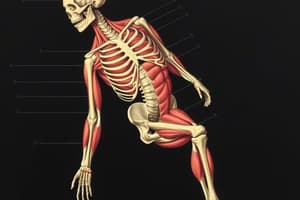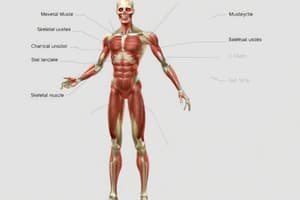Podcast
Questions and Answers
Which type of muscles are NOT under voluntary control?
Which type of muscles are NOT under voluntary control?
- Muscles attached to bones
- Skeletal muscles
- Smooth muscles (correct)
- Cardiac muscles
Where are smooth muscles primarily found in the body?
Where are smooth muscles primarily found in the body?
- In the walls of internal organs and blood vessels (correct)
- Involuntarily in the limbs
- In the heart
- In skeletal muscles
What type of muscles interlace to form sheets of smooth muscle tissue?
What type of muscles interlace to form sheets of smooth muscle tissue?
- Smooth muscles (correct)
- Voluntary muscles
- Skeletal muscles
- Cardiac muscles
What is the majority of muscle tissue in the body made up of?
What is the majority of muscle tissue in the body made up of?
Which type of muscles are striated and are NOT under voluntary control?
Which type of muscles are striated and are NOT under voluntary control?
Which type of muscle is responsible for moving bones and attached to bones?
Which type of muscle is responsible for moving bones and attached to bones?
Which of the following is NOT an example of an inherited muscle disorder?
Which of the following is NOT an example of an inherited muscle disorder?
What type of muscles are most commonly affected in Myasthenia Gravis?
What type of muscles are most commonly affected in Myasthenia Gravis?
Which type of muscle disorder is characterized by the weakening and wasting away of muscles?
Which type of muscle disorder is characterized by the weakening and wasting away of muscles?
What is the typical cause of a muscle strain?
What is the typical cause of a muscle strain?
Which of the following is responsible for movement and protection of internal organs?
Which of the following is responsible for movement and protection of internal organs?
Which type of muscle is found in the heart?
Which type of muscle is found in the heart?
Which type of muscle disease is characterized by the heart becoming abnormally enlarged, thickened, and/or stiff?
Which type of muscle disease is characterized by the heart becoming abnormally enlarged, thickened, and/or stiff?
Which muscle problem is more common in older adults and is associated with a risk of around 14-53% in different age groups?
Which muscle problem is more common in older adults and is associated with a risk of around 14-53% in different age groups?
What is a possible risk factor for developing sarcopenia in older adults?
What is a possible risk factor for developing sarcopenia in older adults?
Which muscle problem is characterized by a protrusion of an organ or tissue through a weak area in the muscle?
Which muscle problem is characterized by a protrusion of an organ or tissue through a weak area in the muscle?
Which muscle disease is a rare inflammatory one that can affect people of any age but is more commonly seen in women?
Which muscle disease is a rare inflammatory one that can affect people of any age but is more commonly seen in women?
What type of muscle disease causes loss of muscle mass and strength in older adults?
What type of muscle disease causes loss of muscle mass and strength in older adults?
What is a common method for relieving muscle cramps?
What is a common method for relieving muscle cramps?
Which of the following is a common remedy for tendinitis?
Which of the following is a common remedy for tendinitis?
What is considered a potential risk factor for developing sarcopenia in older adults?
What is considered a potential risk factor for developing sarcopenia in older adults?
What is commonly advised as a post-hernia surgery precaution?
What is commonly advised as a post-hernia surgery precaution?
In treating a bruise, why is using ice recommended?
In treating a bruise, why is using ice recommended?
What is a common treatment to relieve swelling and pain of a bruise?
What is a common treatment to relieve swelling and pain of a bruise?
In hernia surgery, what is a protrusion through a weak area in the muscle often called?
In hernia surgery, what is a protrusion through a weak area in the muscle often called?
What is a common treatment for tendinitis?
What is a common treatment for tendinitis?
What is a common remedy for getting rid of muscle cramps?
What is a common remedy for getting rid of muscle cramps?
What is a possible risk factor for developing sarcopenia in older adults?
What is a possible risk factor for developing sarcopenia in older adults?
Which of the following is NOT a typical treatment for tendinitis?
Which of the following is NOT a typical treatment for tendinitis?
What is a common method for relieving bruises caused by muscle injury?
What is a common method for relieving bruises caused by muscle injury?
In the context of hernia surgery, what is usually required to repair a hernia?
In the context of hernia surgery, what is usually required to repair a hernia?
What is a common treatment for tendinitis, a condition characterized by inflammation or irritation of a tendon?
What is a common treatment for tendinitis, a condition characterized by inflammation or irritation of a tendon?
For relieving muscle cramps, what is a commonly recommended remedy?
For relieving muscle cramps, what is a commonly recommended remedy?
Among the given options, which is NOT a recognized risk factor for sarcopenia in older adults?
Among the given options, which is NOT a recognized risk factor for sarcopenia in older adults?
When addressing sarcopenia risk, which of the following factors can contribute to muscle weakness in some individuals?
When addressing sarcopenia risk, which of the following factors can contribute to muscle weakness in some individuals?
Flashcards are hidden until you start studying
Study Notes
Muscle Types and Control
- Involuntary muscles include smooth and cardiac muscles, which operate without conscious control.
- Smooth muscles are primarily located in the walls of hollow organs such as the intestines, blood vessels, and bladder.
- Sheets of smooth muscle tissue are formed by interlacing smooth muscle fibers.
Muscle Composition
- The majority of muscle tissue in the body consists of skeletal muscle, which facilitates voluntary movement by connecting to bones.
- Striated muscles that are not under voluntary control are referred to as cardiac muscles, found in the heart.
Muscle Disorders
- Muscular dystrophy is an example of an inherited muscle disorder, while acquired conditions are not considered inherited.
- Myasthenia Gravis primarily affects skeletal muscles, leading to weakness and fatigue.
- Atrophy is characterized by the weakening and wasting away of muscles, which may be caused by disuse or disease.
Muscle Strains and Injuries
- Muscle strains typically occur from overstretching or tearing due to excessive physical activity or improper lifting techniques.
- Smooth muscles are responsible for the movement and protection of internal organs.
- Cardiac muscle, which is specialized for the heart, handles the pumping of blood.
Aging and Muscle Health
- Heart disease includes muscle conditions characterized by an enlarged, thickened, or stiff heart, impacting cardiovascular function.
- Sarcopenia, a common muscle problem in older adults, affects approximately 14-53% of different age groups, resulting in loss of muscle mass and strength.
- Risk factors for developing sarcopenia include inadequate nutrition, sedentary lifestyle, and hormonal changes.
- A hernia is a protrusion of an organ through a weak area in the muscle, often requiring surgical repair.
Muscle Treatment and Rehabilitation
- Ice is commonly recommended for treating bruises, as it helps reduce swelling and numb pain.
- Swelling and pain from a bruise can be alleviated with rest, ice, compression, and elevation.
- Tendinitis, characterized by inflammation of a tendon, is often treated with rest, ice, anti-inflammatory medications, and physical therapy.
- Common remedies for muscle cramps include stretching, hydration, and warm compresses.
General Knowledge on Hernias
- Post-hernia surgery precautions often involve avoiding heavy lifting and strenuous activities to prevent recurrence.
- Repairing a hernia usually requires surgical intervention to strengthen the weak muscle area.
Studying That Suits You
Use AI to generate personalized quizzes and flashcards to suit your learning preferences.




